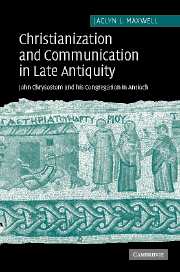 Christianization and Communication in Late Antiquity
Christianization and Communication in Late Antiquity Book contents
- Frontmatter
- Contents
- Acknowledgments
- List of abbreviations
- Introduction
- Chapter 1 Philosophical preaching in the Roman world
- Chapter 2 Rhetoric and society: Contexts of public speaking in late antique Antioch
- Chapter 3 John Chrysostom's congregation in Antioch
- Chapter 4 Teaching to the converted: John Chrysostom's pedagogy
- Chapter 5 Practical knowledge and religious life
- Chapter 6 Habits and the Christianization of daily life
- Conclusions
- Bibliography
- Index
Chapter 2 - Rhetoric and society: Contexts of public speaking in late antique Antioch
Published online by Cambridge University Press: 22 September 2009
- Frontmatter
- Contents
- Acknowledgments
- List of abbreviations
- Introduction
- Chapter 1 Philosophical preaching in the Roman world
- Chapter 2 Rhetoric and society: Contexts of public speaking in late antique Antioch
- Chapter 3 John Chrysostom's congregation in Antioch
- Chapter 4 Teaching to the converted: John Chrysostom's pedagogy
- Chapter 5 Practical knowledge and religious life
- Chapter 6 Habits and the Christianization of daily life
- Conclusions
- Bibliography
- Index
Summary
Christians in Antioch were well acquainted with public speaking outside of their churches. In addition to moralizing speeches by Cynics and other philosophers, other types of oratory such as political discourse and entertainment shaped the social milieu in which Christian preachers flourished. This culture of public speaking helps to explain how and why ordinary people listened to sermons such as John Chrysostom's. Although most of Chrysostom's listeners were less educated than their preacher, they lived in one of the most vibrant cities of the late Roman Empire, where numerous civic events featured rhetorical speaking. The world outside the church affected the interactions within it: the urban setting was where the laypeople developed their taste for eloquence, where preachers acquired rhetorical skills, and where these skills acquired prestige.
Ordinary people talked about politics. Chrysostom compared the calm, spiritual conversations held by monks to the constant political discussions carried on by members of his congregation. These conversations seemed like pointless trivia to Chrysostom, but ordinary people were interested in facts about the failures, successes, and scandals of public figures. Likewise, they also memorized lyrics they heard in the theaters. In order to have these discussions and sing the songs in the barbershops and marketplace, they had to listen to political announcements and attend theatrical performances. Although Chrysostom dismissed these concerns as distractions from the Christian life, experiences in political and theatrical contexts helped to prepare laypeople to listen to and understand rhetorically crafted speeches such as his own sermons.
- Type
- Chapter
- Information
- Christianization and Communication in Late AntiquityJohn Chrysostom and his Congregation in Antioch, pp. 42 - 64Publisher: Cambridge University PressPrint publication year: 2006


